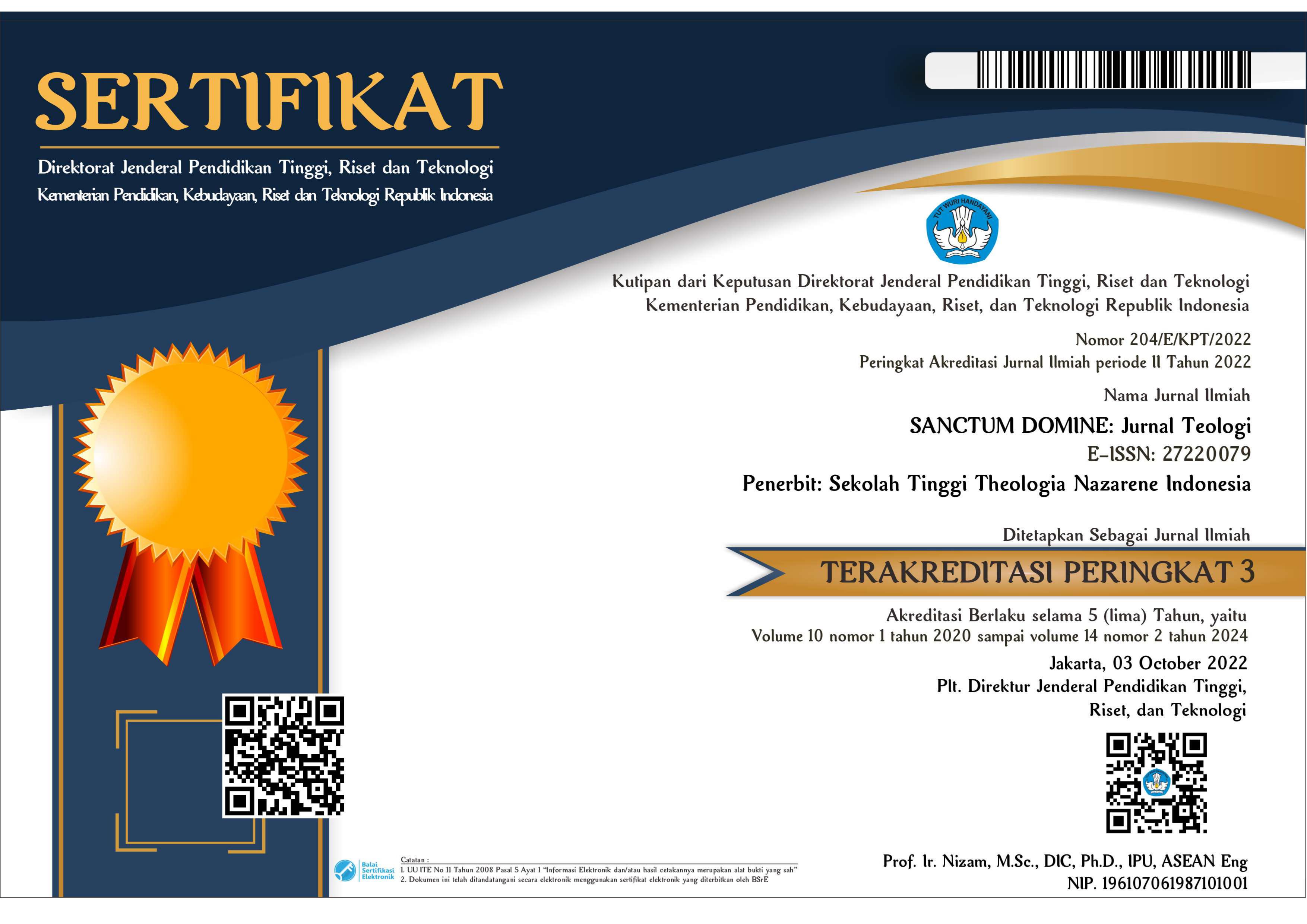Memahami Pluralisme
Abstract
The idea of pluralism is developing of religious thought, arises by influenced of development of cultural thought, ideology, certain interests, and the power interest. Also the situation of new religions, enter and meet the old religion. At the first, religion is generally exclusivist, but tolerance interest develop it to be inclusive, and finally pluralist, so does for Christianity, as well as other religions. There is truth in each religion, itsmust be respected, but righteous and savetyjust only in its own religion and belief. The real pluralism rejects the notion of every religion can bring its followers to heaven or to save.
References
Coward, Horald. Pluralisme Tantangan bagi Agama-agama. Yogyakarta: Penerbit Kanisius, 1989.
D’Costa, Cavin (penyunting). Mempertimbangkan Kembali Keunikan Agama Kristen. Jakarta: BPK Gunung Mulia, 2009.
Dister, Nico Syukur. Filsafat Agama Kristen, Yogyakarta: Penerbit Kanisius, BPK Gunung Mulia, 1989.
Enns, Paul. The Moody Handbook of Theology, terj: Rahmiati Tanudjaja. Malang: Literatur SAAT, 2007.
Knitter, Paul F. Satu Bumi Banyak Agama, terj: Noco A. Likumahua.Jakarta: BPK Gunung Mulia, 2015.
Maksum, Ali. Pengantar Filsafat: Dari Masa Kalsik hingga Postmodernisme. Jogjakarta: AR-RUZZ MEDIA, 2008.
Schumann, Olaf H. Dialog Antarumat Beragama, Jakarta: BPK Gunung Mulia, 2009.
Smith, Linda dan William Raeper. Ide-ide Filsafat dan Agama Dulu dan Sekarang. Yogyakarta: Penerbit Kanisius, 2000.
Yewangoe, A.A. Agama dan Kerukunan. Jakarta: BPK Gunung Mulia, 2011.
Copyright (c) 2020 SANCTUM DOMINE: JURNAL TEOLOGI

This work is licensed under a Creative Commons Attribution-NonCommercial-ShareAlike 4.0 International License.
Copyright:
SANCTUM DOMINE: Jurnal Teologi will validate, produce, disseminate, and act as steward in the long-term curation of every article published. In order to achieve this, the author typically requires a transfer or “assignment” of the copyright in the article. As is the case for open access publishing, the author (or copyright owner of the article, if different) signs an author publishing agreement. The agreement incorporates the necessary transfer of copyright.
After assigning copyright, the author will still retain the right to:
- Be credited as the author of the article.
- Own and exercise any trademark or patent rights held by author and addressed in the article.
- Make printed copies of the article to use for a lecture or class that the author leading on a non-commercial basis.
- Share the article with friends, colleagues and influential people the author would like to read the work.
- Present the article at a meeting or conference and distribute printed copies of the article on a non-commercial basis.
License:
This work is licensed under a Creative Commons Attribution-NonCommercial-ShareAlike 4.0 International License.
You are free to:
- Share — copy and redistribute the material in any medium or format
- Adapt — remix, transform, and build upon the material
- The licensor cannot revoke these freedoms as long as you follow the license terms.
Under the following terms:
- Attribution — You must give appropriate credit , provide a link to the license, and indicate if changes were made . You may do so in any reasonable manner, but not in any way that suggests the licensor endorses you or your use.
- NonCommercial — You may not use the material for commercial purposes .
- ShareAlike — If you remix, transform, or build upon the material, you must distribute your contributions under the same license as the original.
- No additional restrictions — You may not apply legal terms or technological measures that legally restrict others from doing anything the license permits.
Notices:
You do not have to comply with the license for elements of the material in the public domain or where your use is permitted by an applicable exception or limitation .
No warranties are given. The license may not give you all of the permissions necessary for your intended use. For example, other rights such as publicity, privacy, or moral rights may limit how you use the material.




8.png)









